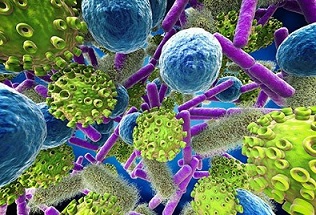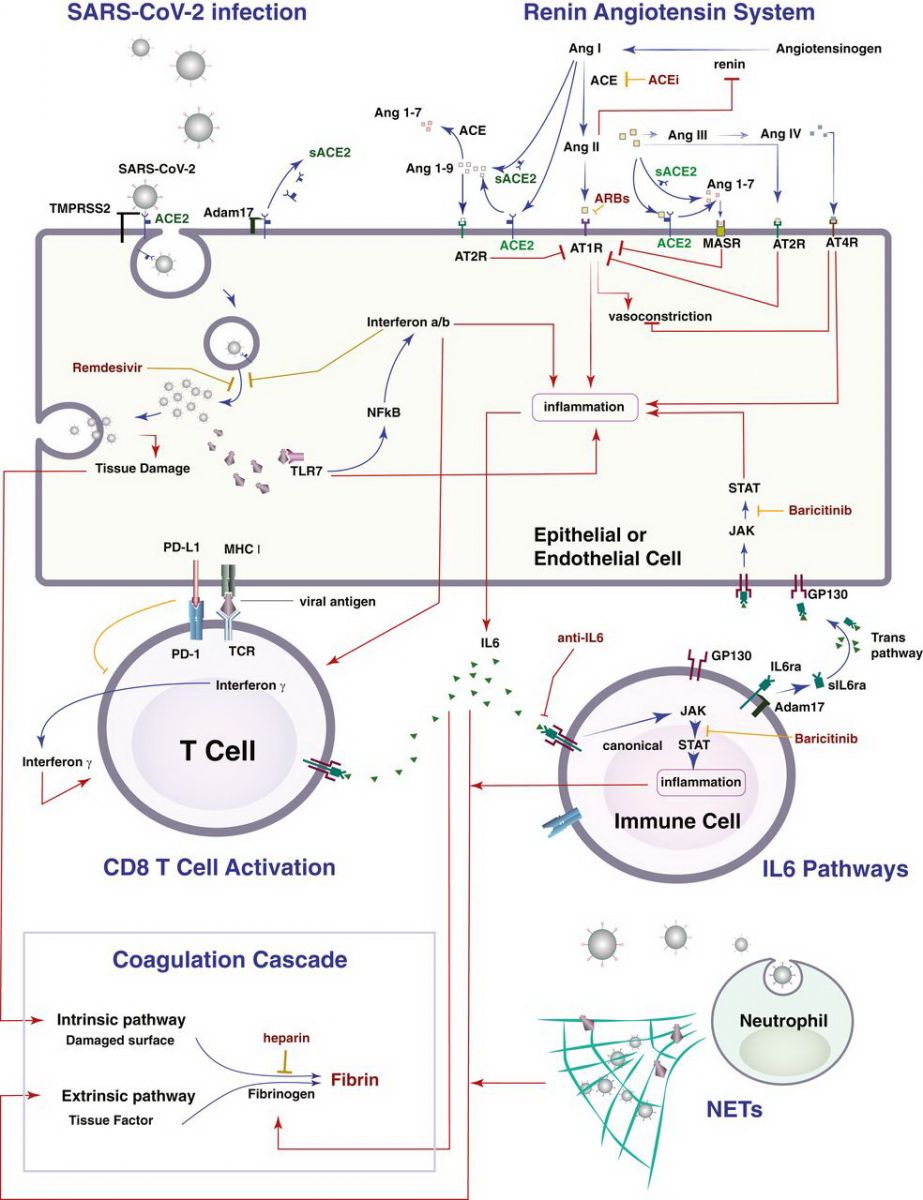COVID-19 Clinical Updates: Massachusetts General Hospital (MGH) Silico Study Reveals Dynamics Of COVID-19 Phenotypes
Source: COVID-19 Clinical Updates Jan 06, 2021 5 years, 1 month, 2 weeks, 3 days, 23 hours, 14 minutes ago
COVID-19 Clinical Updates: A new silico study by researchers from Massachusetts General Hospital (MGH) identifies the dynamics of the different COVID-19 phenotypes for optimizing clinical management and using better therapeutic strategies.

A unique feature of COVID-19 is its extreme heterogeneity ie illness ranges from minimally symptomatic to life threatening. This heterogeneity is a result of a poorly understood combination of patient factors, viral dynamics, antiviral and immune modulating therapies, and dynamics of the innate and adaptive immune responses.
According to the study team, understanding the underlying mechanisms of COVID-19 progression and the impact of various pharmaceutical interventions is crucial for the clinical management of the disease.
The team developed a comprehensive mathematical framework based on the known mechanisms of the SARS-CoV-2 infection, incorporating the renin−angiotensin system and ACE2, which the virus exploits for cellular entry, key elements of the innate and adaptive immune responses, the role of inflammatory cytokines, and the coagulation cascade for thrombus formation.
The model predicts the evolution of viral load, immune cells, cytokines, thrombosis, and oxygen saturation based on patient baseline condition and the presence of comorbidities.
Model predictions were validated with clinical data from healthy individuals and COVID-19 patients, and the results were used to gain insight into identified risk factors of disease progression including older age; comorbidities such as obesity, diabetes, and hypertension; and dysregulated immune response.
The study team then simulated treatment with various drug classes to identify optimal therapeutic protocols. The team found that the outcome of any treatment depends on the sustained response rate of activated CD8+ T cells and sufficient control of the innate immune response.
Furthermore, the best treatment or combination of treatments depends on the pre-infection health status of the patient. The mathematical framework provides important insight into SARS-CoV-2 pathogenesis and could be used as the basis for personalized, optimal management of COVID-19.
The study findings were published in the peer reviewed journal: Proceedings of the National Academy of Sciences (PNAS).
https://www.pnas.org/content/118/3/e2021642118
The study team says that getting control of COVID-19 will take more than widespread vaccination; it will also require better understanding of why the disease causes no apparent symptoms in some individuals but leads to rapid multi-organ failure and death in others, as well as better insight into what treatments work best and for which patients.
In order to meet this unprecedented challenge, researchers at Massachusetts General Hospital (MGH), in collaboration with investigators from Brigham and Women's Hospital and the University of Cyprus, have created a mathematical model based on biology that incorporates information about the known infectious machinery of SARS-CoV-2, the virus that causes COVID-19, and about the potential mechanisms of action of various treatments that have been tested in
patients with COVID-19.
Corresponding author Dr Rakesh K. Jain, Ph.D., from the Edwin L. Steele Laboratories in the Department of Radiation Oncology at MGH and Harvard Medical School (HMS) told Thailand Medical News, "Our model predicts that antiviral and anti-inflammatory drugs that were first employed to treat COVID-19 might have limited efficacy, depending on the stage of the disease progression."
 Schematic of the detailed lung model. The model incorporates the virus infection of epithelial and endothelial cells, the RAS, T cells activation and immune checkpoints, the known IL6 pathways, neutrophils, and macrophages, as well as the formation of NETs, and the coagulation cascade. The lung model is coupled with a PK/PD model for the virus and thrombi dissemination through the body.
Schematic of the detailed lung model. The model incorporates the virus infection of epithelial and endothelial cells, the RAS, T cells activation and immune checkpoints, the known IL6 pathways, neutrophils, and macrophages, as well as the formation of NETs, and the coagulation cascade. The lung model is coupled with a PK/PD model for the virus and thrombi dissemination through the body.
Dr Jain and colleagues found that in all patients, the viral load (the level of SARS-CoV-2 particles in the bloodstream) increases during early lung infection, but then may go in different directions starting after Day 5, depending on levels of key immune guardian cells, called T cells. T cells are the first responders of the immune system that effectively coordinate other aspects of immunity. The T cell response is known as adaptive immunity because it is flexible and responds to immediate threats.
It was found that in patients younger than 35 who have healthy immune systems, a sustained recruitment of T cells occurs, accompanied by a reduction in viral load and inflammation and a decrease in nonspecific immune cells (so-called "innate" immunity). All of these processes lead to lower risk for blood clot formation and to restoring oxygen levels in lung tissues, and these patients tend to recover.
However in contrast, individuals who have higher levels of inflammation at the time of infection such as those with diabetes, obesity or high blood pressure or whose immune systems are tilted toward more active innate immune responses but less effective adaptive immune responses tend to have poor outcomes.
The study team also sought to answer the question of why men tend have more severe COVID-19 compared with women, and found that although the adaptive immune response is not as vigorous in women as in men, women have lower levels of a protein called TMPRSS2 that allows SARS-CoV-2 to enter and infect normal cells.
.jpg) Summary of model predictions for the therapeutic outcome of combined treatments for male patients > 65 y old. The tables present results at the end of the simulation (day 20). Values have been normalized to the corresponding initial values except for SpO2. Dex., dexamethasone.
Summary of model predictions for the therapeutic outcome of combined treatments for male patients > 65 y old. The tables present results at the end of the simulation (day 20). Values have been normalized to the corresponding initial values except for SpO2. Dex., dexamethasone.
From the study findings, the study team proposes that optimal treatment for older patients who are likely to already have inflammation and impaired immune responses compared with younger patients should include the clot-preventing drug heparin and/or the use of an immune response-modifying drug (checkpoint inhibitor) in early stages of the disease, and the anti-inflammatory drug dexamethasone at later stages.
Importantly in patients with pre-existing conditions such as obesity, diabetes and high blood pressure or immune system abnormalities, treatment might also include drugs specifically targeted against inflammation-promoting substances (cytokines, such as interleukin-6) in the body, as well as drugs that can inhibit the renin-angiotensin system (the body's main blood pressure control mechanism), thereby preventing activation of abnormal blood pressure and resistance to blood flow that can occur in response to viral infections.
Interestingly this work shows how tools originally developed for cancer research can be useful for understanding COVID-19: The model was first created to analyze involvement of the renin angiotensin system in the development of fibrous tissues in tumors, but was modified to include SARS-CoV-2 infection and COVID-19-specific mechanisms.
The study team is further developing the model and plans to use it to examine the dynamics of the immune system in response to different types of COVID-19 vaccines as well as cancer-specific comorbidities that might require special considerations for treatment.
The study team did caution certain limitations of the model for instance it does not account for the humoral immune response, although circulating antibodies are important in viral control in COVID-19. Future model development should include this additional complexity of antiviral immunity, as well as modulation of the immune system by vaccines. Also, the model does not account for adverse effects of the various treatments considered in this study, which could affect the therapeutic outcome. For instance, heparin use might be associated with hemorrhage, and RAS inhibitors can reduce blood pressure. Even though incorporation of adverse effects would be important, they would not affect the basic conclusions of the study and were omitted to avoid adding further complexity to the model.
In conclusion, this study presents a mathematical representation of the known mechanisms of COVID-19 and could be utilized by the scientific community as a useful tool for further understanding the disease and investigating the benefits of treatments on a patient-specific basis.
For more
COVID-19 Clinical Updates, keep on logging to Thailand Medical News.


.jpg)